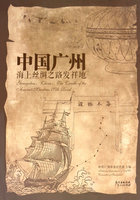
II. The Birthplace of Overseas Trade Administration System in Ancient China
The foundations of the ancient Chinese administration system of international trade were laid in the Tang dynasty, when the Maritime Trade Supervisorates (Shibo Si/Shi, Shi Bo Si, or Si Po Si), or Shibo Shi Yuan (Ministry) as an organization, were created and formed this first organization dedicated to international trade pioneered a new system for later dynasties and governments to administrate overseas trade. The establishment of Shibo Shi (Yuan) leveraged the development of international trade and established the central position of Guangzhou for China's international commerce.
After the Tang dynasty, the Song dynasty set up Maritime Trade Supervisorates in Guangzhou in 971, the 4th year of Kaibao, for overseas trade administration, followed by offices in the southeastern ports of Mingzhou, Hangzhou, Quanzhou, Wenzhou, Xiuzhou and Mizhou. The Maritime Trade Supervisorates in Guangdong, Fujian and Zhejiang, or "Shibo trio", were principal, with the Guangzhou office being the busiest. The Shibo regulations issued in the Song dynasty appeared more comprehensive than the previous dynasty after many revisions. The "Guangzhou Shibo Regulations" drafted and issued in the 3rd year of Yuanfeng of the Song dynasty became the template for the administration of international trade of the Song dynasty, also providing the first dedicated laws and regulations on the administration of overseas trade, exerting a profound influence on later generations. The power delegated to the Maritime Trade Supervisorates in the "Guangzhou Shibo Regulations" was conducive to the control of foreign trade at the national level, which marked a new centralizing phase of the development of the ancient Chinese administrative system for international trade. With the importance of overseas trade expansion in the Yuan dynasty, seven Shibo Tiju Si (departments) were established in Guangzhou and other ports and on the basis of the"Guangzhou Shibo Regulations", the "Yanyou Shibo Laws" were issued.
At the beginning of the Ming dynasty, a tributary trade system was adopted, and Maritime Trade Supervisorates were set up in Guangdong, Fujian and Zhejiang. Guangdong Maritime Trade Supervisorates took charge of the official trade with the countries of the South China Sea. In 1405, the 3rd year of Yongle, Huaiyuan Yi (Department/Office) was set up in Guangzhou. During the reign of Emperor Jiajing, Japanese pirates harassed China's coastline and the Zhejiang Maritime Trade Supervisorates was removed and the Fujian Maritime Trade Supervisorates was abandoned, leaving only Guangdong Maritime Trade Supervisorates to trade with Macau. Overseas trade tended to be concentrated in Guangzhou, thus foregrounding the position and role of Guangzhou in the foreign trade of the country.
In 1684, the 23rd year of Kangxi of Qing dynasty, the Qing's army recovered Taiwan, and the next year the Ban on Maritime Trade with the Overseas was lifted. Customs Houses were established in Guangdong, Fujian, Zhejiang and Jiangsu as administration institutions for overseas trade. In 1686, the 25th year of Kangxi, Guangdong set up the Thirteen Factories dedicated to trading with Western countries. They were called also Hong (foreign firms), or the Thirteen Factories. Guangdong Customs House was the official administration body for handling foreign affairs, which not only took charge of collecting tariffs on foreign merchant ships in and out of Guangzhou port, but also handled affairs related to foreigners. The Guangdong Customs House, however, did not involve itself directly with the foreign merchants to maintain the dignity of the Central Kingdom. Instead, the Customs House entrusted the Thirteen Factories to manage foreign trade and foreign merchants. After 1757, the 22nd year of Qianlong, merchants from the West were banned from trading in Fujian and Zhejiang, leaving Guangzhou as the only "port for foreign trade". From then on, Guangzhou handled the majority of China's foreign trade, hence its central position in the global maritime trading network. The "Canton Trade System" exerted tremendous historical impact on the formation of global trade and on the development of China's impact on international trade.